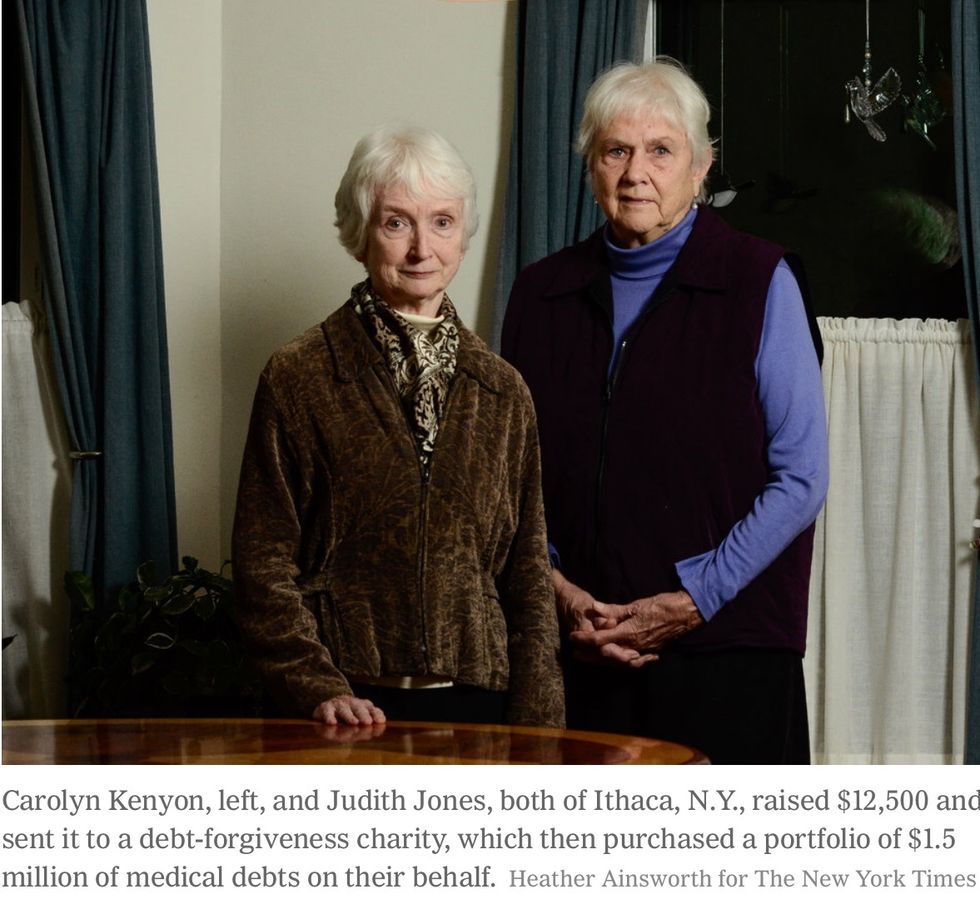If a slim, yellow envelope with a Rye, N.Y., return address lands in your mailbox this holiday season, don't throw it out. It's not junk.
Some 1,300 such envelopes have been sent to New Yorkers around the state, containing the good news that R.I.P. Medical Debt, a New York-based nonprofit organization, has purchased their medical debt — and forgiven it.
Last spring, Judith Jones and Carolyn Kenyon, both of Ithaca, N.Y., heard about R.I.P. Medical Debt, which purchases bundles of past-due medical bills and forgives them to help those in need. So the women decided to start a fund-raising campaign of their own to assist people with medical debt in New York.

Over the summer months, the women raised $12,500 and sent it to the debt-forgiveness charity, which then purchased a portfolio of $1.5 million of medical debts on their behalf, for about half a penny on the dollar.Ms. Jones, 80, a retired chemist, and Ms. Kenyon, 70, a psychoanalyst, are members of the Finger Lakes chapter of the Campaign for New York Health, which supports universal health coverage through passage of the New York Health Act.
"The way sort of opened," Ms. Jones said. They cast a wide net for donations, she said, explaining to people that the campaign was only a short-term fix for the larger problem of out-of-control medical costs.
Many people take on extra jobs or hours to afford health care, and 11 percent of Americans have turned to charity for relief from medical debts, according to a 2016 poll conducted by The Times and the Kaiser Family Foundation.
The 1,284 New Yorkers who had their debts forgiven live in 40 of the state's 62 counties, from Westchester to Chautauqua. The sources of the debt were some 130 hospitals and branches that had provided medical services, R.I.P. Medical Debt said.It has become increasingly easy for regular citizens to purchase bundles of past-due medical bills and forgive them because of the efforts of the debt-relief charity, which was founded in 2014 by two former debt collection industry executives, Craig Antico and Jerry Ashton.
After realizing the crushing impact medical debts were having on millions of Americans, the men decided to flip their mind-set. They began purchasing portfolios of old debts to clear them as a public service, rather than try to hound the debtors.
"I like doing this much more than I liked doing collecting," Mr. Antico said.
R.I.P. Medical Debt had its first star turn in 2016, when John Oliver did a segment on his HBO show "Last Week Tonight," in which he paid $60,000 to forgive $14.9 million in medical debts through the charity. About 9,000 people received the yellow forgiveness envelopes as a result.
Since then, other high-profile efforts to forgive debts through the charity include fund-raisers sponsored by NBC and Telemundo affiliates.
In all, the organization says its donations have forgiven $434 million in medical debt so far, assisting some 250,000 people. That remains only a fraction, though, of the more than $750 billion in past-due medical debt that it says Americans owe.
"It is a drop in the bucket," Mr. Antico said.
R.I.P. Medical Debt specifically seeks to buy the debts of people who earn less than two times the federal poverty level, those in financial hardship and people facing insolvency.
It purchases the portfolios at a steep discount, a penny or less on the dollar. These bills have typically passed through several collection agencies and months or years of collections. The people, who do not know they have been selected, receive the debt relief as a tax-free gift, and it comes off their credit reports.
Mr. Antico said he thought of his charity as a "resolutionary, not a revolutionary" effort, one that offers people relief, but that cannot solve underlying issues like high medical costs. Through personal data associated with the debt accounts, they are able to target specific classes of people, such as veterans, to relieve their debts.
"I do like the idea that people do not have to ask for help," he said. "The random act of kindness is kind of a cool thing."
The envelopes from Ms. Jones and Ms. Kenyon's gift went out in November, but new letters are going out all the time. And don't worry. Even if you throw your yellow letter out, your debt is still forgiven. You just might not know about it until the next time you run your credit.
Sharon Ottrman, New York Times, Dec. 5, 2018
###
Dec. 6, 2018
Post Script. I enjoyed reading this. So I thought you too.
"Do as much good as you can for as long as you can" - @HillaryClinton.
#RandomActsofKindnes

